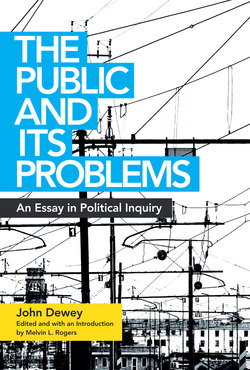Читать книгу The Public and Its Problems - Джон Дьюи - Страница 6
На сайте Литреса книга снята с продажи.
ОглавлениеContents
Acknowledgments
Chronology
Editorial Note
Introduction: Revisiting The Public and Its Problems
Melvin L. Rogers
John Dewey, The Public and Its Problems: An Essay in Political Inquiry
Foreword (1927)
Introduction (1946)
1. Search for the Public
Divergence of facts and theoretical interpretations concerning the nature of the state. Practical import of theories. Theories in terms of causal origin. Theory in terms of perceived consequences. Distinction of private and public substituted for that of individual and social. The influence of association. Plurality of associations. Criterion of the public. Function of the state. The state as an experimental problem. Summary.
2. Discovery of the State
Public and state. Geographical extent. Multiplicity of states. Spread of consequences. Law is not command. Law and reasonableness. The public and long-established habits of action. Fear of the new. Irreparable consequences. Variation of state-functions according to circumstances of time and place. State and government. State and society. The pluralistic theory.
3. The Democratic State
Private and representative rôles of officials. Selection of rulers by irrelevant methods. The problem of control of officials. Meanings of democracy. Fallacy as to origin of democratic government. Influence of non-political factors. The origin of “individualism.” Influence of the new industry; the theory of “natural” economic laws. James Mill’s philosophy of democratic government. Criticism of “individualism.” Criticism of antithesis of natural and artificial. Wants and aims as functions of social life. Persistence of pre-industrial institutions. Final problem.
4. The Eclipse of the Public
Local origin of American democratic government. National unification due to technological factors. Submergence of the public. Disparity of inherited ideas and machinery with actual conditions. Illustrations of resulting failures. Problem of discovering the public. Democracy versus the expert. Explanation of eclipse of public. Illustrated by the World War. Application of criteria of the public. Failure of traditional principles. Political apathy accounted for. Need of experts. Rivals of political interest. Ideals and instrumentalities.
5. Search for the Great Community
Democracy as idea and as governmental behavior. Problem of the Great Community. Meaning of the democratic ideal. Democracy and community life. Community and associated activity. Communication and the community. Intellectual conditions of the Great Community. Habit and intelligence. Science and knowledge. Limitations upon social inquiry. Isolation of social inquiry. Pure and applied science. Communication and public opinion. Limitations of distribution of knowledge. Communication as art.
6. The Problem of Method
Antithesis between individual and social as obstruction to method. Meaning of individual. Where opposition lies. Meaning of absolutistic logic. Illustration from doctrine of “evolution.” From psychology. Difference of human and physical science. Experimental inquiry as alternative. Method, and government by experts. Democracy and education by discussion. The level of intelligence. The necessity of local community life. Problem of restoration. Tendencies making for reëstablishment. Connection of this problem with the problem of political intelligence.
Editor’s Notes
Bibliographical Essay
Index
